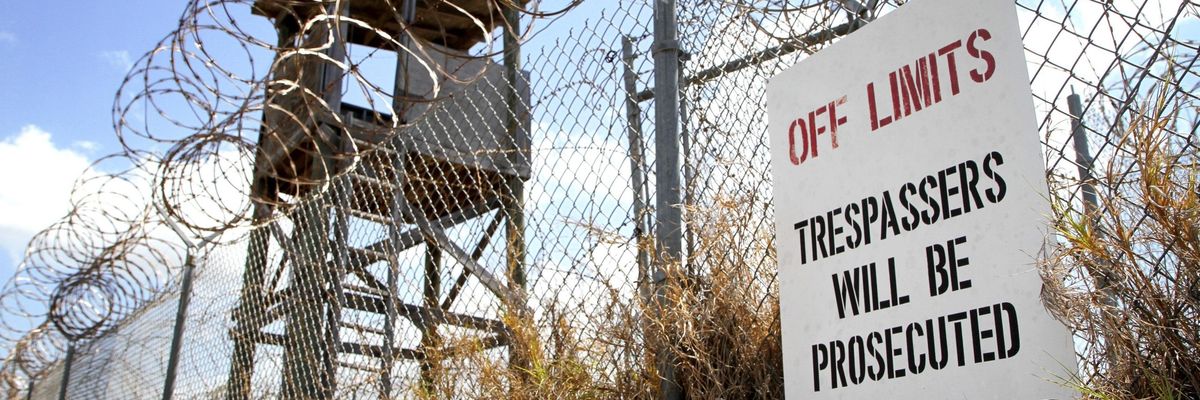It’s difficult to conclude that the U.S. military is, from top to bottom, subject to the rule of law when considering the privileged status that its leaders and policymakers enjoy: their lies go unchallenged and their failures go unpunished. America does not recognize the authority of the same international institutions that we insist others join and Pentagon spending is never the target of deficit and inflation hawkery. Most importantly, U.S. military policymaking — and its impacts — has been rendered wholly inaccessible and invisible to the American people.
Perhaps nowhere is this impunity more evident than at the Guantanamo Bay prison, the military detention center which opened 20 years ago today.
On January 11, 2002, the U.S. military brought 20 terrorist suspects to Guantanamo for imprisonment.. These detainees, military officials said then, were the “worst of the worst” — al-Qaida and Taliban members captured on the battlefield in Afghanistan.
Three months after the devastating 9/11 terror attacks, Americans were proving themselves capable of supporting just about anything done in the name of our collective safety and security: only 4 percent of Americans opposed the Bush administration’s indefinite, unlawful detention of “enemy combatants” when GITMO opened.
It would become abundantly clear over the ensuing decades that GITMO was at best inconsequential to America’s counterterrorism efforts, and at worst a potent recruitment tool for terror groups like ISIS. Yet, as Mauritanian author and former Guantanamo Bay detainee Mohamedou Ould Slahi said recently, “When the military is in motion, the truth can’t keep up.”
Winning the “Global War on Terror,” we were told, required the operation of an extrajudicial military prison in Cuba. To advance the Freedom Agenda — to win the battle between democracy and dictatorship — America had to subject 119 foreign Muslim men to the CIA’s rendition, detention, and interrogation program, and torture at least 39. We had to detain, interrogate, and even abuse the 780 Muslim men and boys brought to GITMO since 2002, and some even say now that we still have to keep those remaining 39 detainees there — 27 of whom are being held without any charges against them.
From Vietnam to Iraq and beyond, a defining trait of America’s post-WWII U.S. military actions is their complete disconnect from compelling American interests. Our leaders entered these conflicts in the name of American security — and they were repeatedly extended and perpetuated long-after it became clear that they would fail to deliver on any of America’s strategic interests (to say nothing of the vast and bloody civilian toll caused by America’s overt and covert military actions). The creation of the Guantanamo Bay prison has followed a similar trajectory.
Over the last 20 years, the 2001 Authorization for Use of Military Force that the Bush administration used to justify GITMO’s opening has also been used to justify U.S. military operations in at least 22 countries. GITMO is a perfect microcosm of the Global War on Terror that birthed it — its evidently ineffective and contrary to America’s stated values, yet it appears to be a permanent fixture of U.S. foreign policy.
This is why President Biden’s withdrawal from Afghanistan seemed so remarkable: He was squaring a broken U.S. military policy (spending billions of dollars and risking American lives indefinitely in pursuit of a long-failed nation building project) with what was in the best interests of the American people. Yet Afghanistan was the exception that proves the rule; Biden has largely re-committed America to bloody, ineffective militaristic foreign policies — like spending $778 on the military while failing to invest in climate action, or pursuing the beginnings of a new Cold War with China — that make foreign policy elites very happy, while delivering few tangible benefits, and plenty of risks, to the American people.
Subjecting the U.S. military to the rule of law will be no small task, so those of us taking up the fight against America’s pursuit of military hegemony must be clear-eyed about the challenges ahead. The last 20 years at GITMO, which were marked by torture, abuse, and political promises made and broken, are an important reminder: even our most evidently flawed military policies are not “up for debate” in Washington. Despite relentless, fearless organizing and activism against GITMO, neither Congress nor the president has felt the political risks of closing GITMO outweigh the benefits of kicking the can down the road. But those of us standing in opposition to the war machine should also consider the Afghanistan withdrawal, and take heart: This impunity does not last forever. These policies are sacrosanct, right up until the moment that they aren’t, when the calculus changes.
















